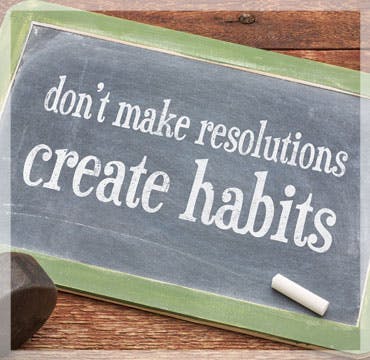How to Build Healthy Habits
Whether you want to develop healthy eating habits or a better brushing routine, there are proven ways to build healthy habits that stick.
Small Changes Can Lead to Amazing Results
Want to make a change in your life for the better? That’s great, but achieving total wellness isn’t something you can do overnight. There’s a process to follow, and you have to be willing to put in the work. “Healthy and productive habits, like studying more effectively or being more diligent at work, can be developed with proper care,” says Jonathan Alpert, a Manhattan psychotherapist, performance coach, and author of Be Fearless: Change Your Life in 28 Days. Use these strategies to reach your goals for anything from exercising more to improving your oral health.
Tips for Building Healthy Habits
Try these tips to build habits for a healthy life.
1. Focus on Small Changes First
It’s important to set yourself up for success—not failure. You can do that by giving yourself a series of achievable actions that, over time, will add up to a healthy habit.
“Don’t start with a complete makeover,“ says Alpert. “Setting up small tasks that you can actually accomplish will help to reinforce behaviors that support the goal as well as provide you with a sense of control.” For example, if you're trying to get into shape and want to embark on an exercise program, Alpert says to introduce walking briskly for 10 minutes a day for the first week, and increase it from there. If you want to boost your oral health, giving up all sugary foods might be too difficult from the get-go. Instead, start by decreasing your full-sugar soft drink intake, and make it a priority to brush twice a day.
2. Start Early in the Day
Feel like you’re at your best after a good night’s sleep? You’re not alone. Most people feel more energetic at the beginning of the day, says Alpert, and are less likely to make excuses. Harness that momentum by scheduling new tasks in the morning. Alpert recommends that his clients allow 30 minutes each morning for self-care. Part of that can be moving your body—exercise or stretching. The remainder of the time could be devoted to hygiene. Wash and moisturize your face. After that, brush your teeth with anti-gingivitus parodontax Active Gum Repair Whitening Toothpaste, which promotes strong teeth and is clinically proven to help prevent bleeding gums.
3. Make It Convenient
Things that are easy are more likely to become routine. “Brushing teeth, shaving and grocery shopping for most are habit because they’re basic needs,” says Alpert. These tasks become habituated over time, says Alpert, but that can happen more quickly if the things you need to accomplish them are readily accessible. “By organizing our lives, we're able to accomplish these mundane tasks without much resistance or problem.”
4. Understand Your Motivation
According to Alpert, people are typically motivated in two different ways: to move toward something positive and desirable or to move away from something negative. Your reason for adopting healthy habits can be just as important as the habits themselves. Ask yourself whether you are moving toward something positive or away from something negative? “The former is far more powerful and lasting,” says Alpert. So, if the goal behind your new healthy habit is to avoid something bad, simply recast that motivation as achieving something good. For instance, instead of trying to curb unhealthy eating habits, focus on trying to increase healthy eating habits.
5. Use Triggers to Your Advantage
Triggers typically are thought of as being related to a negative or unhealthy habit, such as overeating when watching TV at night, says Alpert. “Just as a stimulus can trigger a bad behavior, it can lead to a positive behavior,” says Alpert. In the watching TV example, he suggests setting up a new healthy behavior, like eating carrots or even flossing your teeth, so you’re ready to brush right before bed. This new, healthier behavior will soon become habit.
6. Prepare for Roadbocks
Ask yourself what might get in your way of building habits you want. “If you anticipate and troubleshoot possible resistance or stoppers, then you can devise a way to counter them,” says Alpert. “By acknowledging an excuse before it happens, you'll weaken it, and it no longer will hold power over you.” All you need is an actionable plan to put into place if something stressful or counterproductive arises.





